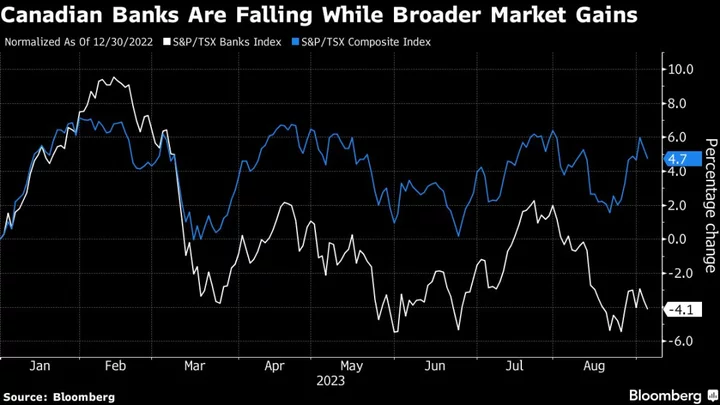With economic storm clouds gathering, Canada’s bank regulator is considering stricter capital requirements that some analysts say have the potential to force Royal Bank of Canada, the nation’s biggest lender, to sell equity.
The banks, which make up the largest sector weighting on the S&P/TSX Composite Index, have dropped 4.6% this year, compared with the 4.3% advance in the broader market as concerns rise about a downturn in the country’s housing market and as quarterly results were largely a disappointment.
At the same time, the banks are running up against increasingly stringent rules in Canada, where the banking regulator has been raising minimum capital requirements. Currently, banks must keep a common equity tier one ratio of at least 11.5%. Analysts expect that ratio may climb to 12% in December, adding further pressure to the country’s biggest lenders.
Some analysts see a scenario in which RBC may need to issue additional equity in order to meet that threshold because it is also seeking to close its C$13.5-billion acquisition of HSBC Canada.
Read More: RBC Faces Pressure on Capital as Canada Regulator Gets Tougher
“If they raise it by 50 basis points in December and the banks have a couple weeks to get there, then it’s a problem,” National Bank analyst Gabriel Dechaine said by phone. “Royal becomes pretty tight against that minimum.”
The situation bears a resemblance to the Bank of Montreal selling C$3.15 billion ($2.31 billion) in shares in December after the Office of the Superintendent of Financial Institutions delivered a surprise 50 basis-point hike to the domestic stability buffer, aiming to keep clear of the regulatory requirement as it acquired Bank of the West.
Equity Issuance
A similar financing round by RBC, which is also Canada’s largest publicly listed company, could substantially lift total issuances for the year in Toronto. Equity issuances on the Toronto Stock Exchange totaled just C$5.8 billion through July, a 54% drop from a year earlier as IPOs, secondaries and supplemental financings have all declined, data from TMX Group show.
RBC Chief Financial Officer Nadine Ahn said on an earnings call in late August that the bank expects to keep its ratio above the 12% threshold following the closure of its HSBC Canada deal early next year.
The bank is currently “operating with a strong CET 1 ratio of 14.1 per cent, well above regulatory minimums” as of the third quarter 2023, Tanis Feasby, RBC’s director of financial communications, said in a statement Wednesday. “We continue to prudently manage our capital taking into account multiple factors,” including current and potential future requirements.
RBC would be more likely to “hack away” at HSBC’s riskier loans rather than issue new equity, Industrial Alliance portfolio manager Daneshvar Rohinton said in an interview. Even so, the acquisition is expected to shave 240 basis points off Royal’s CET1 ratio, he said.
Still, other analysts see the potential for an equity raise similar to what BMO did at the end of 2022 if the banking regulator raises minimum common equity requirements once again.
“At worst, RBC might elect to issue incremental capital to build a buffer above 12% but it doesn’t appear likely a sizeable equity raise would be needed to meet a 12% requirement,” Veritas Investment Research analyst Nigel D’Souza said in an email.
(Updates to add RBC comment in ninth paragraph)

